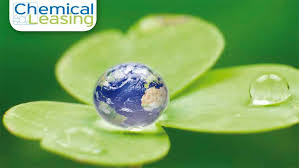To those of you involved in industrial business practices who might be unfamiliar with the business practice of chemical leasing, this blog will hopefully shed some light on the practice, because it can make a big difference for your industrial business. First, chemical leasing involves a chemical company that supplies its developed chemical(s) for a specific purpose, making a chemical available for use to a client or customer, but that chemical company retains the rights and ownership of that chemical. At first, this might sound like a questionable business practice to industrial businesses that use certain chemicals to clean and degrease industrial parts, metals, and materials of particles and contaminants that prove harmful to an industrial components intended use. However, the intention of chemical leasing is to improve the economical and environmental factors involved in the use of chemical agents to clean and degrease industrial components. Essentially, the producer of a chemical makes available the functionality of a chemical, but not the chemical itself. Why? Well, chemical leasing allows for the sustainable management of chemicals. Some may read this and feel as though it is a method of policing industrial organizations. However, the truth is chemical uses are constantly changing. Putting those who developed the science behind the produced chemicals responsible for making the necessary changes or improvements on the chemicals in use, or even recalling or terminating its use if it has been found that the compounds that make up the chemical are hazardous to people and/or to the environment ensures that safety is optimized.
It has been determined that industrial businesses who use chemical components to clean and degrease industrial parts, metals, and materials do not keep up to date with changes in the effects and ramifications of using certain chemical compounds. You see, sometimes when a chemical has been put in commercial use several years ago, it can still have discoveries made on it several years later that would require changes made to the chemical, and more often than not the scientists behind the creation of the chemicals are usually the ones making the discovery, or the ones first notifies. Unfortunately, the industrial organizations using the chemical, that has been recently found to be potentially harmful, are the last ones to know about the news, and keep the chemical in use a long time after it has been determined to be unsafe. Moreover, some industrial businesses are so happy with the cleaning and degreasing elements to the chemical it uses that there is hesitance to replace it with something else, even if it has been determined as hazardous. By placing the onus of monitoring the compounding agents used in creating certain chemicals on the chemical company through the practice of chemical leasing, it is easier to stop the use of specific chemicals and make the necessary changes to ensure no harmful agents are in commercial use.
For more about chemical leasing, contact Ecolink. Ecolink can help you better understand the business model associated with chemical leasing, and can ensure your company takes full advantage of the benefits associated with chemical leasing.















